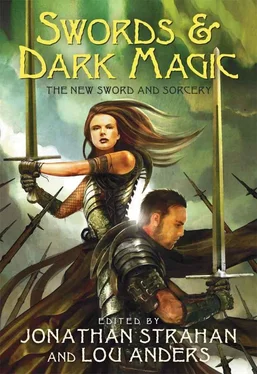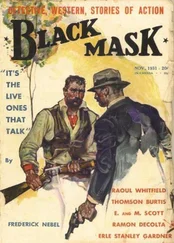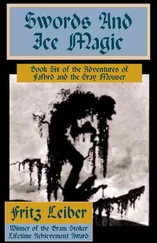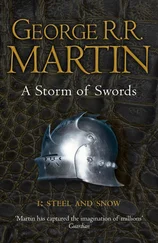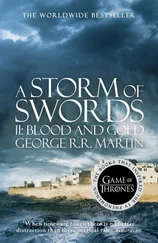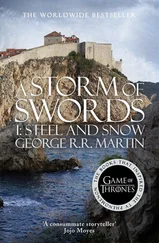To drink until you vomit and then drink again is dull work. It requires no talent and won’t gain you fame or fortune. It’s usually followed by a deep dark stretch of unconsciousness, though, so it had become Morlock Ambrosius’ favorite pastime.
In a brief lapse from chronic drunkenness he had invented a device which intensified the potency of wine many times. Because he had no use for gold (he could make it by the cartful if he needed it), he gave the device to Leen, the owner of the Broken Fist tavern. Leen proceeded to make gold by the cartful, through the more mundane method of selling distilled liquor. By his order, Morlock’s cup was never to be left empty when he entered the Broken Fist. Morlock entered the Broken Fist on a daily basis thereafter and stayed until the disgusted potboys tossed him, snoring, into the street. In another time and place, Morlock might have been called an alcoholic. In the masterless lands east of the Narrow Sea, he was simply a man drinking himself to death—and not quickly enough for those few who had to deal with him.
One evening, as Morlock was just settling down to work, a man came up to him and asked, “Is it true that you’re Morlock the Maker?”
If Morlock had been a little more sober, he would have just denied it. If he’d been a little drunker, he would have embarked on an elaborate series of lies to make the questioner suspect that he himself might be Morlock the Maker. And if Morlock had been very much drunker, he wouldn’t have been able to answer at all. But, as it happens, he was at that precise state when he was able to know the truth and not care. Apart from actual oblivion, it was the state of mind he enjoyed the most.
“I’m Morlock,” he said, lifting his slightly crooked shoulders in a shrug. “What’s your poison? They have to serve you for free if you drink with me, you know. Drink with me, get served for free—that’s practically a song, isn’t it?”
“I don’t want a drink,” the questioner said, sitting down at Morlock’s table. “I want help.”
“I’m not in the help business. I’m in the drinking business.”
“That’s not a business.”
“Not with your lacka—lacka—lackadaisical attitude, no. But I take these things more seriously.”
Morlock drank several cups of distilled wine while the other told him a long, involved story and then concluded, “So you see, don’t you, that you have to help?”
“I might, if I’d been listening,” Morlock admitted. “Thank God Avenger, I wasn’t.”
“You useless bucket of snot!” the other shouted. “Didn’t you hear me tell you that Viklorn has the Singing Spear?”
“I heard you that time. Who’s Viklorn—some juggler or carnival dancer?” Morlock could see how a singing spear might be useful in a carnival act. Almost involuntarily, his mind began to envision various ways to make a spear sing on cue.
“Viklorn!” shouted the other man. “The pirate and robber! He’s been using the singing spear to kill and rob all along the coast of the Narrow Sea. And now they say he’s killed his own crew with it and is coming inland with Andhrakar.”
“Wait a moment.”
“And you sit there sucking down that swill—”
“You’re telling me that this ‘singing spear’ is the weapon called Andhrakar?”
“Yes. And if you—”
“Just who was stupid enough to take the spear and start using it?”
The other looked at Morlock almost pityingly. “Viklorn. A pirate and robber.”
“Moron, you mean. Well, it’s no skin off my walrus.”
“You mean you won’t help?”
“I knew you’d catch up eventually. Drink? No? Mind if I do?”
“You made the damned thing! It’s your responsibility to do something about it!”
“I made the weapon called Andhrakar,” Morlock admitted. “Arguably, I also damned it. I didn’t make Viklorn, though. Perhaps you’ll have better luck if you consult his creator.”
The other stared at Morlock for a while, then got up and walked off without a word. He rode away west that night to fight Viklorn, and was killed by the weapon called Andhrakar. It was also called “the singing spear” because, before it killed someone, it began to emit a faint musical tone, which grew louder and deeper until it sank into a human body and was satisfied with blood and life.
That’s how it was with Morlock’s questioner. He came upon Viklorn in the night, hoping to surprise him. But Viklorn did not sleep, could not sleep, remembering the things he had seen and done, and watching the visions that Andhrakar put in his head. He heard the man approaching stealthily through the brush and leapt up from his bedroll. Andhrakar, the singing spear, was ready in his hand—in fact, he could not let go of it now. Through Andhrakar’s magic, his fingers were oak-hard, growing into the wooden shaft of the spear, bound in an unbreakable grip on the damned weapon he had chosen to wield.
Viklorn fought the man who longed to kill him, silently in the dark, until both men heard the spear begin to sing (faint and high at first, but then stronger, deeper, louder), and both men groaned (the one with fear, the other with anticipation). Soon Andhrakar split the attacker’s torso and grew still. Viklorn left the corpse unburied in the dark and lay back down on his bedroll, next to the spreading pool of blood. Thus died the man Morlock would not help, a brave man but not very shrewd. No one remembers his name.
Morlock was shrewd, on occasion, but he didn’t think of himself as brave. Some drunks, perhaps, display courage, but Morlock wasn’t that type. He drank because he was afraid, of life and of death. It hadn’t always been that way. Once Morlock had been a hero, at least in the eyes of some—in any case, he’d been a more useful sort of person than he was now. But that part of him was used up. So he jeered at himself: only a coward would drink and drink because he was afraid of the pain life held.
Viklorn continued to rob and kill throughout the region. You had to call it robbery, for he took stuff and destroyed what he couldn’t take. But he was likely to leave what he took by the roadside or in an open field. He stole because part of him was still Viklorn, a robber. But there was not enough of the man left to remember what robbers robbed for, what use they made of the things they took. Increasingly, he simply killed and killed, destroying with fire what he could not kill with Andhrakar.
“Why did you make that damn spear?” the barkeep asked Morlock one night, before he was too drunk to answer sensibly.
“I had my reasons,” Morlock answered sensibly.
Later that night, Leen, the owner of the Broken Fist and the man to whom Morlock had entrusted the invention of the still, sat down beside him. Now that Leen was wealthy, he never stood behind the bar himself; he was so short that he had trouble seeing over it. Back in the days when he couldn’t afford to hire help, he’d kept a series of boxes behind the bar, and it had been fun to watch him deftly leaping from box to box. And if he ever needed to climb over the bar to take care of an unruly customer, he saw to it that the customer would never be a problem again. Morlock rather liked him, although he understood that to Leen he was just another gullible drunk.
“Morlock,” Leen began.
“Leen.”
“Morlock, what do you think you can do about Viklorn and Andhrakar?”
“Leen,” Morlock answered sensibly (but just barely), “what do you think I can do about Viklorn and Andhrakar?”
Leen stood up and walked away. The faces scattered around the barroom, never friendly, turned to Morlock afterward with especial distaste. Morlock, never sensitive, was uncomfortable enough to leave while he was still conscious, an unusual event.
Читать дальше
